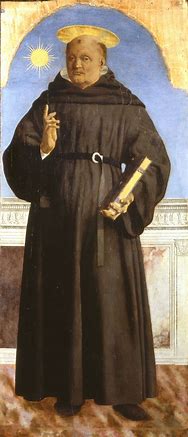
SEPTEMBER 10 is the traditional memorial of ST. NICHOLAS OF TOLENTINO (+1305).
Nicholas was named after St. Nicholas of Myra, to whom his parents prayed asking for a child. Not only did the gift-bearing saint arrange for them to have a child, he gave them an intelligent, studious, kind, gentle, meek child.
Born in Sant’Angelo Pontano around 1245, Nicholas wanted to be a monk after hearing a preacher speak. He joined the Augustinian monks at 18 and was ordained at 25. Even before ordination, he was sent to various monasteries as an example of the best of monks. Once he was ordained, he quickly gained a reputation as a preacher and confessor.
In 1274, Nicholas had a vision of angels singing about Tolentino. He moved there soon after. Tolentino is in central Italy, not too far from his hometown. During the 12th and 13th centuries, a rivalry existed between the Guelphs and the Ghibellines, representing the Papacy and the Holy Roman Empire, respectively. The rivalry consisted of intermittent civil unrest, bordering on civil war. Tolentino was in the middle of the conflict. There were many poor and prisoners in that town.
Nicholas approached the situation as a peacemaker. But his first priority was as a pastor. His prayers were accompanied by serious fasting. He ministered to the poor and visited prisoners. He worked to counteract the decline of morality and religion which comes with the development of city life.
Once, after long fasting, Nicholas was very hungry. He had a vision that the Blessed Virgin and St. Augustine told him to get bread that was marked with a cross, dip it in water, and eat it. He immediately felt better. He, then, began to get this bread to the sick, praying to the Blessed Virgin as he did. Cures resulted.
After these lengthy fasts, Nicholas would have visions, including those of Purgatory. He began to pray for the Souls in Purgatory and encouraged prayers for them. This became an outstanding character of his spirituality. He would pray while walking around the town, visiting people.
Nicholas suffered a long illness before dying on September 10. 1305. During his canonization process, 100 years later, three hundred miracles were cited, including three people who were brought back to life. Pope Eugene IV celebrated the canonization in 1446.
“My dearest brethren, my conscience does not reproach me with anything—but I am not justified by that.”—-St. Nicholas


Recent Comments